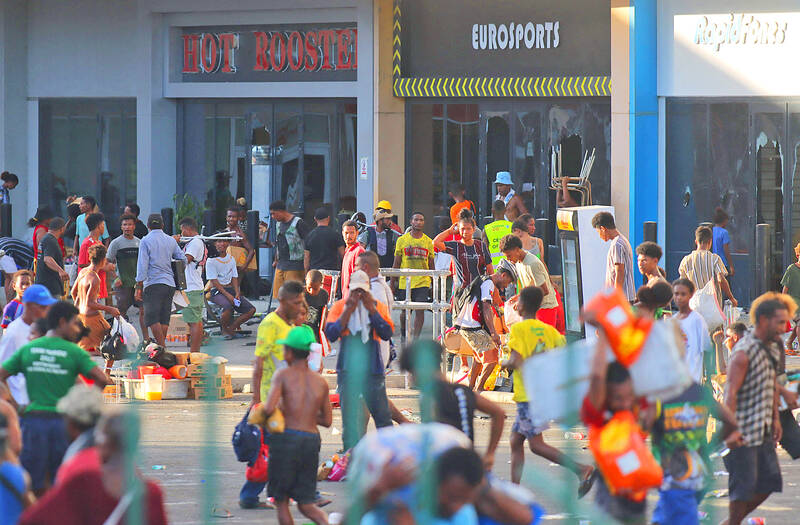Papua New Guinea (PNG) is in early talks with China on a potential security and policing deal, Papua New Guinean Minister of Foreign Affairs and Trade Justin Tkachenko said yesterday, weeks after deadly riots in the South Pacific nation’s capital.
Amid jostling between Washington and Beijing for influence in the Pacific, the biggest Pacific Island nation, PNG, has previously said that Australia and the US are its security partners, while China is an important economic partner.
China approached PNG in September last year with an offer to assist its police force with training, equipment and surveillance technology, Tkachenko said in an interview with Reuters. Talks continued last week.

Photo: AFP
“We deal with China at this stage only at economic and trade level. They are one of our biggest trading partners, but they have offered to assist our policing and security on the internal security side,” Tkachenko said.
PNG is to assess if the Chinese offer duplicates security and policing assistance already being offered by Australia and the US, he said.
“It is still in early stages of negotiation with our Commissioner of Police and our Minister of Internal Security,” he said. “They have offered it to us, but we have not accepted it at this point in time.”
The Chinese Ministry of Foreign Affairs did not immediately respond to a request for comment.
China is a “strong economic partner” of PNG and the two nations formed diplomatic ties in 1975, Tkachenko said.
PNG last month signed a A$200 million (US$132 million) security deal with Australia to boost policing and days later Papua New Guinean Prime Minister James Marape told an investment conference in Sydney that he had not held talks with China on security when he visited Beijing in October last year.
PNG had chosen Australia and the US as security partners, he said.
Riots in PNG’s capital, Port Moresby, earlier this month left at least 16 dead, with major retail stores burned and looted, after police held a strike over pay. Marape’s government called in the PNG Defence Force to restore order, but did not seek Australia’s help.
The Chinese embassy complained to PNG over the safety risk to Chinese citizens living in Port Moresby.
PNG in May last year struck a Defense Cooperation Agreement with Washington during a visit by US Secretary of State Antony Blinken, giving the US military access to PNG ports and airports.
Tkachenko said PNG would not do anything to jeopardize its defense and security relationships with Australia or the US, and was not a “fence-sitter.”
Riots in the neighboring Solomon Islands in 2021 saw China strike security and policing pacts with the administration of Solomon Islands Prime Minister Manasseh Sogavare a year later, alarming Washington and Canberra.
Australian Minister for International Development and the Pacific Pat Conroy yesterday pledged A$35 million in policing assistance to neighboring East Timor during an official visit, amid concern in Canberra that Beijing is again aggressively targeting the police and security sectors in the Pacific.
Conroy today is to visit Nauru, which earlier this month switched diplomatic ties from Taiwan to Beijing.

A Chinese aircraft carrier group entered Japan’s economic waters over the weekend, before exiting to conduct drills involving fighter jets, the Japanese Ministry of Defense said yesterday. The Liaoning aircraft carrier, two missile destroyers and one fast combat supply ship sailed about 300km southwest of Japan’s easternmost island of Minamitori on Saturday, a ministry statement said. It was the first time a Chinese aircraft carrier had entered that part of Japan’s exclusive economic zone (EEZ), a ministry spokesman said. “We think the Chinese military is trying to improve its operational capability and ability to conduct operations in distant areas,” the spokesman said. China’s growing

Nine retired generals from Taiwan, Japan and the US have been invited to participate in a tabletop exercise hosted by the Taipei School of Economics and Political Science Foundation tomorrow and Wednesday that simulates a potential Chinese invasion of Taiwan in 2030, the foundation said yesterday. The five retired Taiwanese generals would include retired admiral Lee Hsi-min (李喜明), joined by retired US Navy admiral Michael Mullen and former chief of staff of the Japan Self-Defense Forces general Shigeru Iwasaki, it said. The simulation aims to offer strategic insights into regional security and peace in the Taiwan Strait, it added. Foundation chair Huang Huang-hsiung

PUBLIC WARNING: The two students had been tricked into going to Hong Kong for a ‘high-paying’ job, which sent them to a scam center in Cambodia Police warned the public not to trust job advertisements touting high pay abroad following the return of two college students over the weekend who had been trafficked and forced to work at a cyberscam center in Cambodia. The two victims, surnamed Lee (李), 18, and Lin (林), 19, were interviewed by police after landing in Taiwan on Saturday. Taichung’s Chingshui Police Precinct said in a statement yesterday that the two students are good friends, and Lin had suspended her studies after seeing the ad promising good pay to work in Hong Kong. Lee’s grandfather on Thursday reported to police that Lee had sent

BUILDUP: US General Dan Caine said Chinese military maneuvers are not routine exercises, but instead are ‘rehearsals for a forced unification’ with Taiwan China poses an increasingly aggressive threat to the US and deterring Beijing is the Pentagon’s top regional priority amid its rapid military buildup and invasion drills near Taiwan, US Secretary of Defense Pete Hegseth said on Tuesday. “Our pacing threat is communist China,” Hegseth told the US House of Representatives Appropriations Subcommittee on Defense during an oversight hearing with US General Dan Caine, chairman of the Joint Chiefs of Staff. “Beijing is preparing for war in the Indo-Pacific as part of its broader strategy to dominate that region and then the world,” Hegseth said, adding that if it succeeds, it could derail